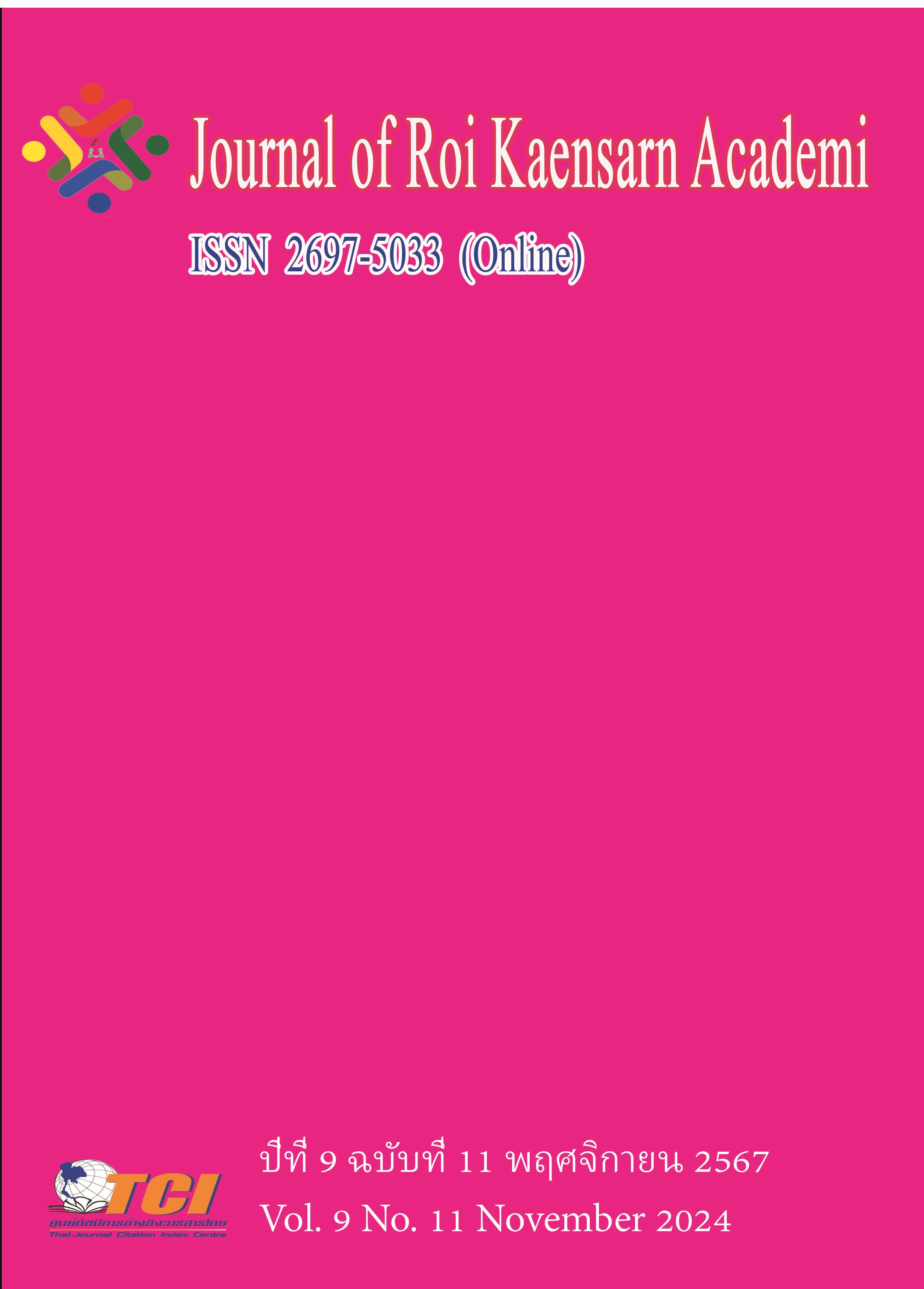The Impact of Digital Technology Application on Logistics Enterprise ESG Performance in VUCA Environment:Base on the Moderated Mediation Model
Main Article Content
Abstract
Against the backdrop of "dual-carbon" goals, the Environmental, Social, and Governance (ESG) performance of logistics enterprises has emerged as a critical factor influencing their competitive advantage and sustainable development. This study investigates the relationship between digital technology application and ESG performance in logistics enterprises, with a particular focus on the mediating role of green innovation and the moderating effect of the VUCA (Volatility, Uncertainty, Complexity, and Ambiguity) environment. Using empirical data from A-share listed logistics companies in China, we employ quantitative analysis methods to test our theoretical framework. The findings reveal that digital technology application significantly enhances both the ESG performance and green innovation capabilities of logistics enterprises. Moreover, green innovation demonstrates a significant positive effect on ESG performance and serves as a crucial mediating mechanism between digital technology application and ESG performance. Additionally, our results indicate that the VUCA environment positively moderates the relationship between digital technology application and ESG performance, with stronger VUCA conditions amplifying the positive impact of digital initiatives. This research contributes to understanding the digital transformation pathway for improving corporate sustainability in the logistics sector and provides practical implications for enterprises seeking to enhance their ESG performance through digital innovation.
Article Details
References
Belousova, V., Bondarenko, O., Chichkanov, N., Lebedev, D., & Miles, I. (2022). Coping with Greenhouse Gas Emissions: Insights from Digital Business Services. Energies, 15 (8), 2745. https://doi.org/10.3390/en15082745.
Bumgardner, M., & Buehlmann, U. (2022). A preliminary assessment of industry 4.0 and digitized manufacturing in the north American woodworking industry. Forest Products Journal, 72 (1), 67-73. https://doi.org/10.13073/FPJ-D-21-00064
Chang, K., Cheng, X., Wang, Y., Liu, Q., & Hu, J. (2021). The impacts of ESG performance and digital finance on corporate financing efficiency in China. Applied Economics Letters, 30, 516-523. https://doi.org/10.1080/13504851.2021.1996527.
Chen, S., & Jia, K. (2020). Research on China's environmental governance in the context of digital transformation: Rethinking and innovating the theoretical foundation. E-Government, (10), 20-28. https://doi.org/10.16582/j.cnki.dzzw.2020.10.002.
Chen, S., & Shen, T. (2022). Does ESG Rating Affect Corporate Innovation?. Frontiers in Business, Economics and Management, 4 (1), 94-99. https://doi.org/10.54097/ fbem.v4i1.510.
Cui, Q., Zhang, S., & Ma, X. Y. (2022). Digital economy, public environmental concern and urban green technology innovation. Research on Technical Economics and Management, (8), 3-9. https://doi.org/10.3969/j.issn.1004-292X.2022.08.001
Fichman, R. G., Dos Santos, B. L., & Zheng, Z. (2014). Digital innovation as a fundamental and powerful concept in the information systems curriculum. MIS quarterly, 38 (2), 329-A15. ttps://www.jstor.org/stable/26634929
Guo, H., & Quan, Q. (2022). Integrated development of digital economy and real economy: measurement evaluation and realization path. Economic Vertical, (11), 72-82. https://doi.org/10.16528/j.cnki.22-1054/f.202211072
Hu, Z. L., & Zheng, M. G. (2021). Corporate strategy differences, environmental uncertainty and business performance volatility. East China Economic Management, (8), 103-115. https://doi.org/10.19629/j.cnki.34-1014/f.210112003
Huang, W., Chau, K., Kit, I., Nureen, N., Irfan, M., & Dilanchiev, A. (2022). Relating Sustainable Business Development Practices and Information Management in Promoting Digital Green Innovation: Evidence From China. Frontiers in Psychology, 13, 930138. https://doi.org/10.3389/fpsyg.2022.930138.
Jiang, S., Li, Y., & You, N. (2023). Corporate digitalization, application modes, and green growth: Evidence from the innovation of Chinese listed companies. Frontiers in Environmental Science, 10, 1103540. https://doi.org/10.3389/fenvs.2022.1103540.
Kerber, W., Kretschmer, J. P., & von Wangenheim, G. (2009, November). Market share thresholds and Herfindahl-Hirschman-Index (HHI) as screening instruments in competition law: A theoretical analysis. In SIDE-ISLE 2009-Fifth Annual Conference.https://www.researchgate.net/publication/228429664_Market_Share_Thresholds_and_Herfindahl-Hirschman-Index_HHI_as_Screening_Instru-ments_in_Competition_Law_A_Theoretical_Analysis
Klumpp, M., & Loske, D. (2021). Sustainability and Resilience Revisited: Impact of Information Technology Disruptions on Empirical Retail Logistics Efficiency. Sustainability, 13, 5650. https://doi.org/10.3390/SU13105650.
Laise, & Overbeck, K. (2005). A public trust at risk: the heritage health index (hhi) report on the state of america's collections. https://www.culturalheritage.org/docs/default-source/hhi/hhifull.pdf
Shen, H., Yu, P., & Wu, L. (2012). State-owned equity, environmental uncertainty and investment efficiency. Economic Research, (7), 113-126. Retrieved from https://qikan.cqvip.com/Qikan/Article/Detail?id=42553517
Subramaniam, M., & Youndt, M. A. (2005). The influence of intellectual capital on the types of innovative capabilities. Academy of Management journal, 48 (3), 450-463. https://doi.org/10.5465/amj.2005.17407911
Sun, G., Pan, S., & Xu, J. (2022). The impact of manufacturing input digitization on green technology innovation - A study based on static and dynamic spatial Durbin models. China Soft Science, (10), 30-40. https://doi.org/10.3969/j.issn.1002-9753.2022.10.004
Wang, F., & Jiang, T. (2014). Research on the impact of environmental regulation on technological innovation capacity in western China. Science Management Research, (2), 51-54. https://doi.org/10.19445/j.cnki.15-1103/g3.2014.02.014
Wang, X., Li, Y., & Chen, N. (2023). How Green Credit Policy Enhances the Financial Performance of Commercial Banks - An Introduction to the Moderating Effects of Operational Efficiency and Financial Innovation. Wuhan Finance, (4), 12-19. https://doi.org/10.13956/j.ss.1001-8409.2022.06.11
Wang, Y., & Guo, Y. (2023). Corporate digital transformation and ESG performance. Financial Studies, 49(9), 94-108. https://doi.org/10.16538/j.cnki.jfe.20230517.301
Wei, H. (2023). Research on the impact effect of digital transformation on enterprise performance [Master's thesis, Zhengzhou University of Light Industry]. China Knowledge. https://doi.org/10.27469/d.cnki.gzzqc.2023.000154
Wojtas, P. I., Kozłowski, A. R., & Wojtas, M. A. (2017). Digitization of Polish mining industry by reducing costs and improving safety and quality of finished product. Mining–Informatics, Automation and Electrical Engineering, 55(3), 57-66. https://doi.org/ 10.7494/miag.2017.3.531.57
Wu, F., Hu, H. Z., & Lin, H. Y. (2021). Corporate digital transformation and capital market performance - Empirical evidence from stock liquidity. Management World, 37 (7), 130-144. https://doi.org/10.3969/j.issn.1002-5502.2021.07.010
Xu, J., Liu, F., & Shang, Y. (2021). R&D investment, ESG performance and green innovation performance: evidence from China. Kybernetes, 50 (3), 737-756. https://doi.org/ 10.1108/K-12-2019-0793
Zhao, C., Wang, W., & Li, X. (2021). How digital transformation affects corporate total factor productivity. Finance and Trade Economics, 42 (7), 114-129. https://doi.org/ 10.3969/j.issn.1002-8102.2021.07.008
Zhong, T., & Ma, F. (2022). Carbon emission reduction effect of enterprise digital transformation: theoretical mechanism and empirical test. Journal of Jianghai, (4), 99-105. https://doi.org/10.3969/j.issn.1000-856X.2022.04.017
Zhong, Y., Zhao, H., & Yin, T. (2023). Resource Bundling: How Does Enterprise Digital Transformation Affect Enterprise ESG Development?. Sustainability, 15 (2), 1319. https://doi.org/10.3390/su15021319.
